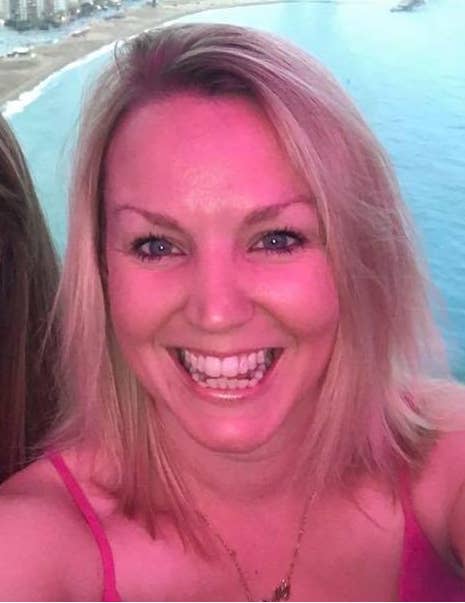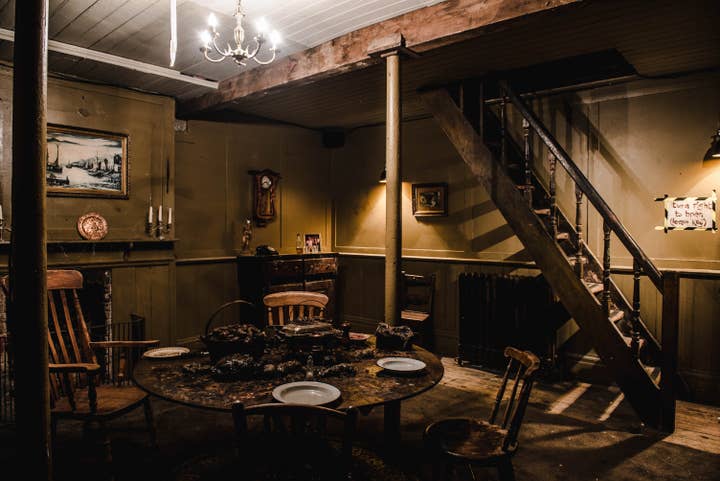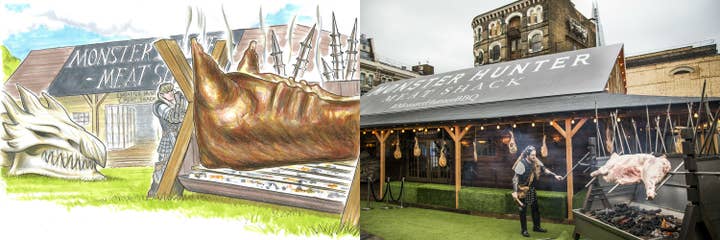The house that Capcom (temporarily) built
Senior PR manager Laura Skelly talks us through the logistics of bringing game worlds to life with pop-up experiences
In an age where advertising seems to penetrate every aspect of our lives, there are plenty of ways to let the public know about your game launch - but sometimes it's worth attempting something a little grander.
Earlier this week, Capcom opened a Monster Hunter-themed meat shack, selling barbecued meat to series fans and passers-by alike. The pop-up experience is open until Sunday, January 28th and has been set up to mark the arrival of the warmly received Monster Hunter Worlds.
It's a nice PR stunt, lending itself to coverage that extends beyond the traditional gaming press and into the remit of London-focused publications and other mainstream media outlets. And the shack is the latest in a string of pop-ups the Capcom UK has used to promote its biggest releases.
Past experiments have included a Monster Hunter Gathering Hall for the launch of Monster Hunter 3 Ultimate, and the Resident Evil 6 butcher shop - complete with edible hands and feet (don't worry, it was sausagemeat). Last year, the publisher grabbed the capital's attention with its Resident Evil VII haunted house.
As you can imagine, a lot of work goes into setting these things up.

"The biggest challenge is actually in the planning itself," Capcom's senior PR manager for UK and EMEA Laura Skelly tells GamesIndustry.biz. "It's a bit like a jigsaw puzzle. You need to have all the pieces to allow you to put the big success together.
"The location is the first challenge you need to overcome. Where's the best place to get the best return for you? For the Monster Hunter BBQ, we needed a location that has indoor space for dining and playing the game and outside space for cooking a massive spit and BBQ in the middle of winter - not as easy as it sounds in the middle of London."
Skelly stresses that finding a winning location is "absolutely key" to the success of a pop-up experience. While the games press may share the dates and other details with core fans, you need to reach a wider audience to warrant the expense and effort. Word of mouth becomes key and positioning your pop-up in a place that people are likely to stumble upon idly increases the chances of that word spreading.
"We needed a location that has indoor space for dining and playing the game and outside space for cooking a massive spit and BBQ in the middle of winter - not as easy as it sounds in the middle of London"
"You also want the general public to be able to get to your location easily without having to travel miles themselves and not spend too much themselves," Skelly points out. "Cost certainly is a factor as the key tourist areas in London are always going to come with a high price tag, but it's possible to opt for locations that still give you a high return and don't blow your whole budget.
"Places like Shoreditch are being used more and more as they offer fantastic locations and spaces that companies can brand for themselves at a reasonable cost. In fact, we hosted the RE7 Experience House there."
But there's a lot more to a successful pop-up experience than simply picking a great, easy-to-access location. Games firms need to think about how long the event will run for, and whether it will be ticket-based or free to enter. While you can hope people will discover it organically as they walk on by, effort needs to go into promoting the event to your most avid fans - the most likely attendees.
And, depending on the nature of the experience you're planning, there may be additional factors to take into account.

"There's the actors," Skelly offers by way of example. "For RE7, we spent months working with a professional team to create the whole experience, which involved mapping out the whole house and filling it with puzzles and then organising the tech to get them to work - but beyond that you need actors to bring it all to life. The auditions are the fun part but you have to ensure you get people that work for you.
"After that comes the props. You want quality in any production first and foremost, so where do you get them from? What examples have you got to work from? And don't forget the smaller details that can really affect your event running as well. For RE7, we had to work with the council to be able to fire a gun every half hour in a residential building, and for Monster Hunter we need to have permission for a live flame.
"Everything comes together and it's always a lot of fun, but there's a lot of work to overcome in order to execute any event and making sure you get that all right is definitely the biggest challenge. Having an event agency on board and also ensuring you have regular and well planned communication with all parties involved is definitely the best way of overcoming any issues."
Just thinking about the logistics might be enough to deter other publishers from attempting such a marketing endeavour, but Skelly insists the impact pop-ups can have make it worth the effort. It's not just about getting your game launch featured in publications that wouldn't normally cover such things - it's also about meeting the people who wouldn't normally attend a video games event.
"People see your experience and learn about your brand you are launching through that. As a result you're widening the potential market of people who hopefully buy your game"
"This is the most exciting part for me as you're talking to and attracting new people to your game, most of which maybe haven't even heard of it before," says Skelly. "The Monster Hunter BBQ, for example, has attracted coverage across food blogs and national press as well as London local media, all of which are outside of the traditional games reviews columns. Readers of those media outlets likely aren't your hardcore gamers, but now they'll know about a game called Monster Hunter that's about to launch and will hopefully pass that on to others.
"People see your experience and learn about the brand you are launching through that. As a result you're widening the potential market who are interested in finding out more and hopefully buying your game to play it for themselves."
Perhaps the best measure for whether a pop-up event is successful is footfall: the number of people who physically enter your creation. Skelly reports thousands of people explored the Resident Evil 7 house around the game's opening weekend - many of whom hadn't played the series before. It even drew out some of the most dedicated fans; since it was not "logistically possible" to move the house to different hubs and reach even more of an audience, Resi players travelled from all over Europe purely to visit this house.
"They'll go away though and talk about your game, and if you're lucky post about it on social media," Skelly adds. "That's going to generate extra buzz and awareness for your brand you're promoting. If you achieve all that, I'd say it's been a worthwhile investment. RE7 won silver in the National Event Awards at the end of the year losing out to Samsung. It would be impossible to take that as anything but a huge win for us in terms of PR within another industry and getting our name and brand noticed."

She continues: "There's definitely scope to keep pop-ups running, but of course costs would go up or you could get licensing teams involved and work with third parties. One way around this would be to charge consumers to take part, but for both of our previous events we haven't wanted to do this - especially as they've been our first large-scale consumer experiences. Both have been learning experiences for us as well.
"You might only start planning the event four months out but I'd recommend having an idea of what you want to do from between six to eight months before launch"
"Our pop-ups to date have been run with quite a minor share of the budget when you look at the wider marketing spend on advertising so we by no means de-value one or the other - it's just all about working together to execute the event."
Of course, a pop-up is not necessarily suitable for every game launch, but if your PR or marketing team has an idea it's worth exploring - if only to make your release stand out from the competition. Skelly advises airing your concept with other people, especially those outside your company, who might be able to identify any unforeseen barriers or missed opportunities.
"I regularly ask a couple of people from the media if they think we're going to have a success on our hands before I sign any contracts," she says. "After all, they are the people that you want to cover the experience so you need to make sure it's newsworthy from the start.
"When we've wanted to create an experiential event for a launch, it's always been an integral part of the plan. You might only want to start the planning of the main event maybe four months out, but I'd recommend having an idea of what you want to do and achieve anywhere from between six to eight months from launch.
"It's important to make it part of your overall PR plans and also build it into the wider marketing and community activity. Working together as a team and having it form part of the overall UK activity is key."
